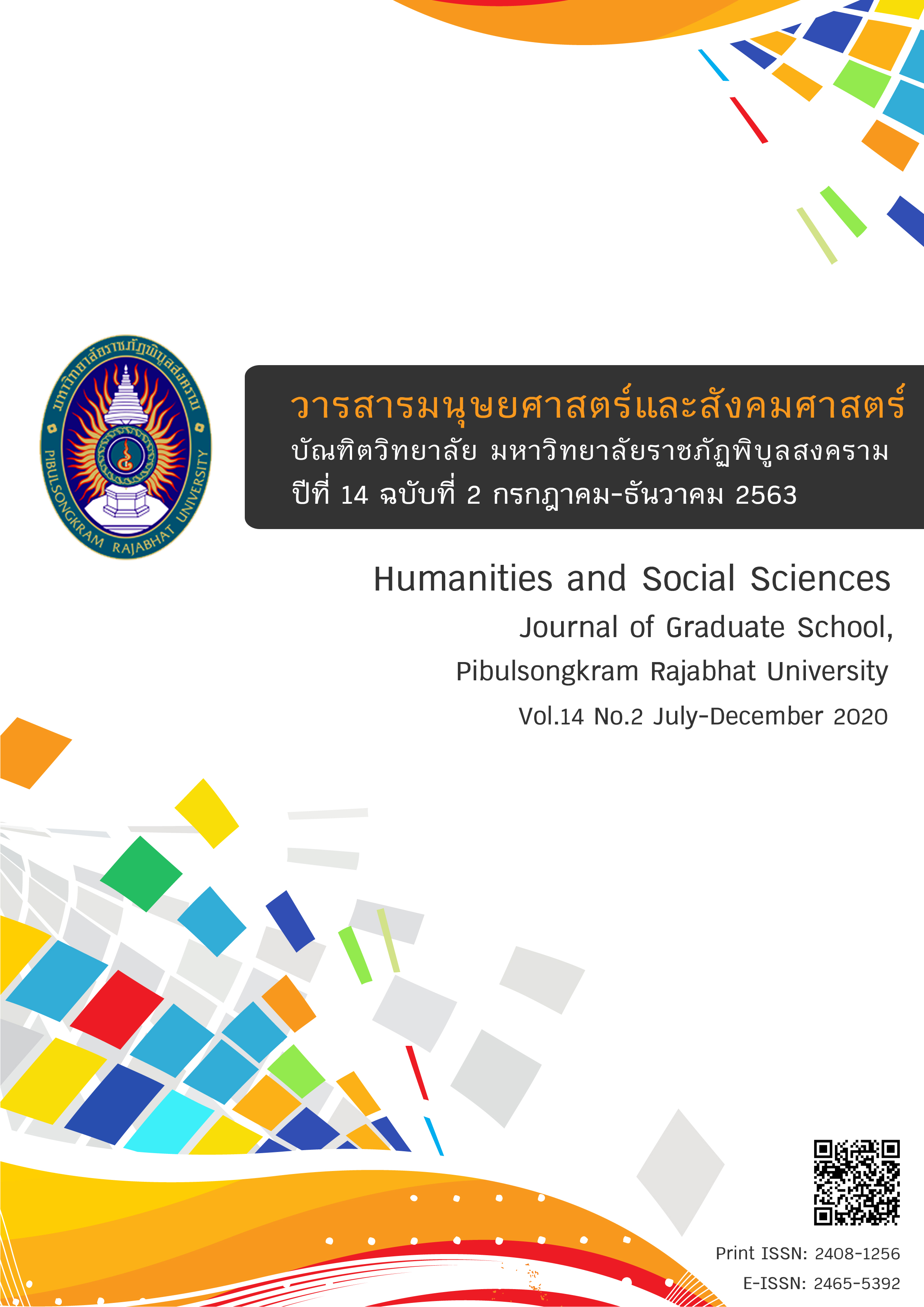Development of Stem Education Activity Packages on Renewable Energy to Enhance Analytical Thinking Ability of Undergraduate Students
Keywords:
STEM Education, Construction of STEM education activity packages, Analytical thinking abilityAbstract
The objectives of the research (one-group pretest - posttest design) were to develop learning activity packages on renewable energy using stem education and to find out effectiveness of learning activity packages. A purposive sample was thirty-five undergraduate students who studied “Science and Technology” in the 1st semester of 2019. The data were collected by using learning activity packages through STEM Education approach, test of academic achievement, test of analytical thinking ability and questionnaires for survey of students’ satisfaction and analyzed by using mean, standard deviation, dependent t-test and one sample t-test. The results found that 1) learning activity packages on Renewable Energy by using STEM Education were consistent and appropriate at a high level, 2) undergraduate students achieved in renewable energy learning after using STEM Education approach higher than before using STEM Education approach with statistically significant difference at .05, 3) the mean scores of the learning achievement of the undergraduate students after using STEM Education approach were 81.03 %, passing the level of criterion (percent 75), 4) the analytical thinking ability in the post-test of undergraduate students was higher than analytical thinking ability in the pre-test with statistically significant difference at .05, 5) undergraduate students’ satisfaction in learning management through STEM Education approach was at a high level.
References
กมลฉัตร กล่อมอิ่ม. (2559). การจัดการเรียนรู้แบบบูรณาการสะเต็มศึกษาสำหรับนักศึกษาวิชาชีพครู. วารสารศึกษาศาสตร์ มหาวิทยาลัยนเรศวร, 18(4), 334-348.
จิราณี เมืองจันทร์. (2557). การพัฒนากิจกรรมการเรียนรู้แบบร่วมมือเทคนิค STAD แบบผสมผสาน เรื่อง คำสั่ง ควบคุมการทำงานของโปรแกรมสำหรับนักเรียนชั้นมัธยมศึกษา ปีที่ 5 (วิทยานิพนธ์การศึกษามหาบัณฑิต). มหาวิทยาลัยนเรศวร, พิษณุโลก.
เดือนงาม นามเมือง. (2552). Problem-based Learning (PBL) การจัดการเรียนรู้โดยใช้ปัญหาเป็นฐาน. วารสารวิชาการ, 12(2), 34-36.
ธิดารัตน์ เสือคง. (2561). การเรียนรู้สะเต็มศึกษาสำหรับนักเรียนระดับอาชีวศึกษา. วารสารวิจัยราชภัฏพระนคร สาขามนุษย์ศาสตร์และสังคมศาสตร์, 13(2), 223-242.
นูรอาซีกีน สาและ. (2560). ผลของการจัดการเรียนรู้ตามแนวคิดสะเต็มศึกษาที่มีต่อผลสัมฤทธิ์ทางการเรียนวิชาเคมีความสามารถในการคิดวิเคราะห์ และความพึงพอใจต่อการจัดการเรียนรู้ของนักเรียนชั้นมัธยมศึกษา ปีที่ 4. วารสารมหาวิทยาลัยนราธิวาสราชนครินทร์, 4(1), 42-53.
ปัจฉา ฉัตราภรณ์, นฤมล สุวรรณจันทร์ดี และบุรินทร์ อัศวพิภพ. (2551). เวลาเปลี่ยน..คะแนนฟิสิกส์เธอเปลี่ยน..ช่างกระไร ใครหนอใครทำ? (ผลการเรียนฟิสิกส์ระดับมหาวิทยาลัย ชั้นปีที่ 1 ในช่วงการเปลี่ยนแปลงระบบการรับเข้าศึกษาต่อในมหาวิทยาลัย). วารสารฟิสิกส์ไทย, 25(3), 19-24.
เรณุมาศ มาอุ่น. (2559). การจัดการเรียนการสอนในระดับอุดมศึกษาอย่างมีประสิทธิภาพ. วารสารเทคโนโลยีภาคใต้, 9(2), 169-176.
วรรณพงษ์ เตรียมโพธิ์ และอาทร นกแก้ว. (2559). STEM (ตอน 1: อะไรและทำไม). สืบค้น 15 กันยายน 2559, จาก http://www.ilearnsci.com/2_STEM(1)
วารินท์พร ฟันเฟื่องฟู. (2560). สะเต็มศึกษากับการศึกษาไทย Stem Education and Thailand Education. วารสารวไลยอลงกรณ์ปริทัศน์ (มนุษยศาสตร์และสังคมศาสตร์), 7(2), 13-23.
วิทยากร เชียงกูล. (2559). สภาวะการศึกษาไทยปี 2557/2558 “จะปฏิรูปการศึกษาไทยให้ทันโลกในศตวรรษที่ 21 ได้อย่างไร. กรุงเทพฯ: พิมพ์ดีการพิมพ์.
ศิริพร มโนพิเชฐวัฒนา. (2547). การพัฒนารูปแบบการจัดการเรียนการสอนวิทยาศาสตร์แบบบูรณาการที่เน้นผู้เรียนมีส่วนร่วมในการเรียนรู้ที่กระตือรือร้น เรื่อง ร่างกายมนุษย์ (วิทยานิพนธ์การศึกษาดุษฎีบัณฑิต). มหาวิทยาลัยศรีนครินทรวิโรฒ, กรุงเทพฯ.
สถาบันส่งเสริมการสอนวิทยาศาสตร์และเทคโนโลยี. (2557). สะเต็มศึกษา (STEM Education). กรุงเทพฯ: สถาบันส่งเสริมการสอนวิทยาศาสตร์และเทคโนโลยี.
สุปรียา ศิริพัฒนกุลขจร. (2548). การพัฒนารูปแบบห้องเรียนเสมือนจริงแบบจำลองสถานการณ์ร่วมกับการฝึกปฏิบัติ เรื่องการผลิตรายการโทรทัศน์ (วิทยานิพนธ์การศึกษาดุษฎีบัณฑิต). มหาวิทยาลัยศรีนครินทรวิโรฒ, กรุงเทพฯ.
สุรางค์ โค้วตระกูล. (2556). จิตวิทยาการศึกษา (พิมพ์ครั้งที่ 11). กรุงเทพฯ: โรงพิมพ์แห่งจุฬาลงกรณ์มหาวิทยาลัย.
สำนักงานคณะกรรมการการศึกษาแห่งชาติ. (2553). พระราชบัญญัติการศึกษาแห่งชาติ พ.ศ. 2542 และแก้ไขเพิ่มเติม (ฉบับที่ 3) พ.ศ. 2553. กรุงเทพฯ: สำนักงานคณะกรรมการการศึกษาแห่งชาติ.
Executive Office of the President. (2010). Report to the President: Prepare and Inspire: K12. Retrieved April 24, 2016, from http://www.whitehouse.gov/osto/pcast.
Institute for Management Development. (2015). World Competitiveness Yearbook 2015. Retrieved April 30, 2016, from http://www.imd.org/new/IMD-releases-its-2015-World-ompetitiveness-Ranking.cfm.
Lardizabal, A. S., & others. (1970). Methods and Principles of Teaching. Quezon City: A Lemer – Phoenix.
National Research Council. (2012). A Framework for K-12 Science Education: Practices, Crosscutting Concept, and Core Ideas. Committee on New Science Education Standards, Board on Science Education, Division of Behavioral and Social Science and Education. Washington, DC: National Academy Press.
World Economic Forum. (2015). The Global Competitiveness Report 2014-2015. Retrieved
October 15, 2016, from http://www.weforum.org.
Downloads
Published
How to Cite
Issue
Section
License
Any articles or comments appearing in the Journal of Humanities and Social Sciences, Rajabhat Phibulsongkram University, are the intellectual property of the authors, and do not necessarily reflect the views of the editorial board. Published articles are copyrighted by the Journal of Humanities and Social Sciences, Rajabhat Phibulsongkram University.









